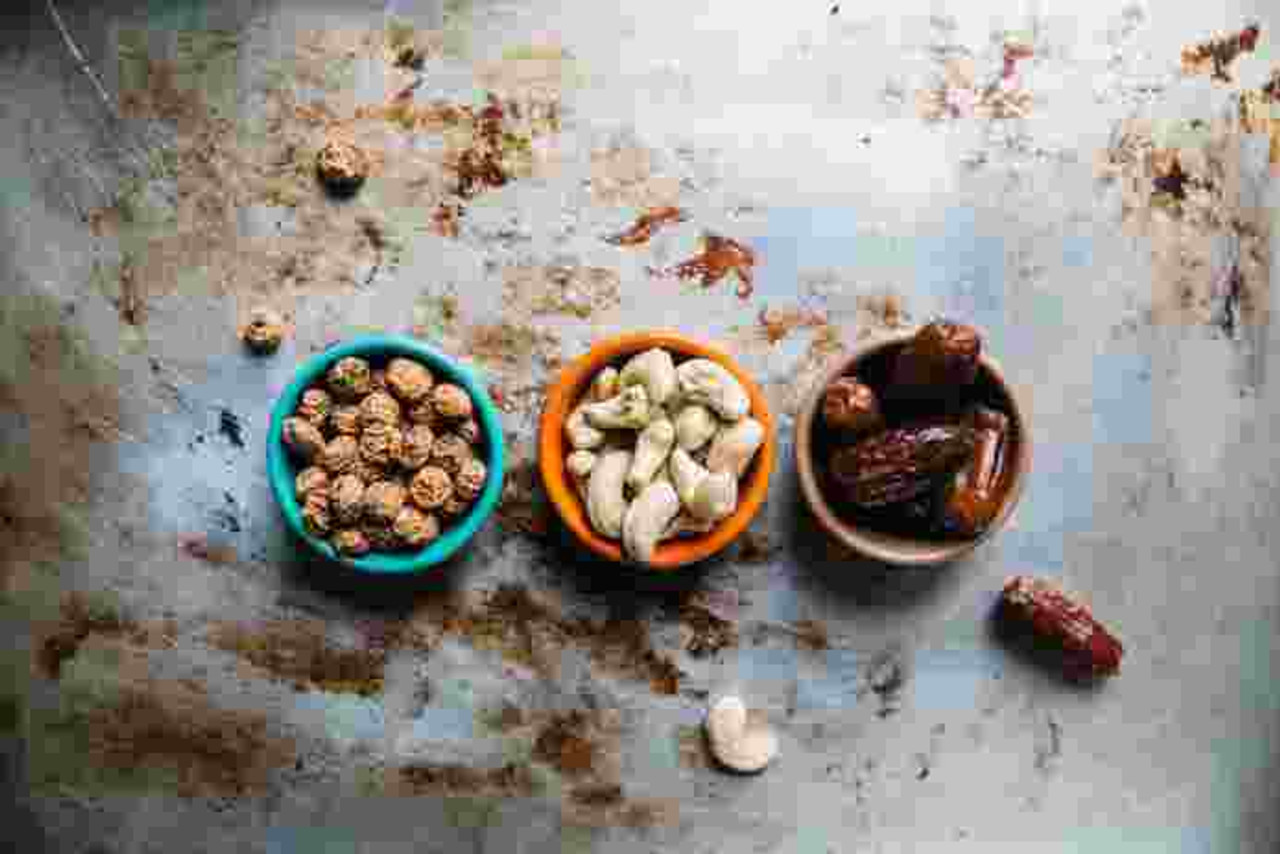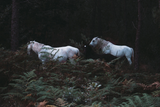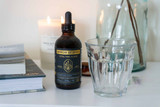Build Jing Through Food and Diet
Eating for Jing
In the historical context of Chinese medicine, diet gave birth to herbalism. And within the overall context of Chinese medicine, diet is considered a stand-alone therapy—not an adjust therapy.

Any disease or disorder that can be treated through acupuncture or herbs can be treated through diet. Understanding that herbalism is really just a type of dietary therapy aids in the understanding of the five pillars of Chinese medicine: Acupressure (Tui Na), acupuncture, dietary therapy, herbalism, and the internal practices (Tai Chi, Qi Gong).
At RAW Forest Foods, we receive many questions along the lines of, “What herbs are good for Jing?” and “What foods are good for Jing?” We also come across a lot of misinformation regarding these questions.
These are difficult questions to answer. Firstly, they are difficult to answer because they assume a misunderstanding—a conflation—of Jing and Yuan Qi. Secondly, they are difficult to answer because there are no herbs or foods for Jing.
Before we dive into the more difficult subject matter, let’s first address Jing and Yuan Qi.
Yuan Qi—Not Jing
Outside of formal study of Chinese medicine, I have yet to hear someone correctly refer to Jing. Without fail, 100 percent of the time, people are referring to Yuan Qi. And I do this, too: Outside of the classroom, I'll freely exchange the work Jing for Yuan Qi. I do this to meet people where they're at, and then through the discussion, I bring up Yuan Qi. But if we're confusing Jing for Yuan QI, what is Jing?
Jing is our blueprint. It is our fate.
Like any blueprint, Jing determines the overall structure of our lives, but it doesn’t determine the wall color. It doesn’t determine which couch we buy or what prints we hang on the wall. Through our lives, we make choices that, in a way, lay on top of our Jing, our fate. But the structure itself remains the same. We can see Jing determine our personalities and we can see Jing determine our genetics.
Again, Jing is a blueprint, not a detailed plan.
Yuan Qi is what most people speak about when they speak about Jing.
Yuan Qi is our deep reserves of energy and vitality housed in the Kidneys. We inherent 50 percent of our Yuan Qi from our parents (Pre-natal Yuan Qi) and we receive 50 percent of our Yuan Qi through our lives (Post-natal Yuan Qi).
Yuan Qi is our constitution, it is our desire, it is our sexual energy, our creativity, our longevity. All those attributes commonly associated with Jing. Through Wei Qi, Yuan Qi is even our immunity.
Foods for Jing or foods for Yuan Qi?
And when people—incorrectly—ascribe foods or nutrition for Jing, they are actually listing those foods for Yuan Qi. A classic example of this are seeds. These nourish Yuan Qi. They don’t touch Jing. They don’t affect Jing.
Affecting Jing is an interesting subject, one filled with questions of ethics and morality: Should a practitioner ever treat the Jing of a person? What does it mean to interfere with someone’s blueprint?
From a Western point of view, the answer may be a clear and resounding Yes. Or, even more so, we may not even see it as a question to ask. However, within Chinese medicine, affecting Jing is more akin to genetic modification. It is, essentially, genetic therapy. When we understand altering Jing as altering someone’s genetics, we can more clearly see how it would come with questions of ethics and morality.
Treating Yuan QI? Of course. Treating Jing? That’s where the questions arise.
If you want to support your Yuan QI, diet and the internal practices should be your focus. To reach the Yuan level, a minimum of three months of daily practice or therapy are required.
Supporting Yuan Qi Through Diet
The first thing to note about tonifying Yuan Qi through diet is that variety and rarity are essential. You need to be constantly rotating the foods that you are eating and eating foods that are new (rare) to you. This does not mean exotic foods—as it is commonly misunderstood to mean—it means foods that are a new experience to you. Are you a vegan or a vegetarian? This may mean eating meat. Do you hate fish and never eat it? This may mean eating fish. While sesame seeds are very nourishing to the Yuan Qi, if you are already eating them, you’ll need to find a different seed.
New foods are essential.
Here is a basic guideline for tonifying Yuan Qi through diet:
Seeds: In particular sesame, chia, and flax.
Nuts: Any, but in particular nuts high in fats.
Shellfish: In particular scallops, clams, oysters, and muscles.
Eggs: Already eat eggs, seek out duck (or other) eggs for variety.
Bone marrow: In particularly soup.
Seaweeds and water vegetables.
Vitamins: Vitamin D, vitamin E, folate/folic acid.
Minerals: Calcium and phosphorus.
Omega 3 fatty acids: Sourced from the SMASH fish (Sardines, mackerel, anchovies, salmon, herring.
Generally, any food that relies on water of its viability, such as shellfish, seaweeds, and sprouts, will tonify Yuan Qi.
Supporting Jing Through Diet
There are times where touching the Jing is desired. This could be when dealing with a congenital, genetic disease. This could be treating a sexually transmitted disease. And it could be because you’ve decided you want to change who you are. This is not about Yuan Qi—this is about a fundamental change to your identity—your blueprint—or it is about treating a disease which has harmed your Jing (an STI).
When people speak about Jing (but are actually speaking about Yuan Qi), Jing is described as a spring. When you are born, it is coiled down, and depending on how you live, you affect how quickly it is sprung, and, possibly, even begin to recoil it. This is a fine way to describe Yuan Qi. But it doesn’t translate to Jing.
We need to think of Jing more as a muscle. You exercise it, it gets stronger. You don’t exercise it, it atrophies. Your body does not keep a muscle around if that muscle isn’t being used.
And Jing is like a skill: The more we practice the better we get. You can even teach yourself a new skill, and you can do it at any age. Some of us are born with natural talents, and through practice, those talents can become more and more refined. When you stop practicing a skill—even a talent—you begin to lose it.
I would argue that Jing is part muscle, part skill.
Jing responds to a need for growth. This is why Jing tends to be so strong in childhood and why, as we age, Jing can atrophy—yet some, even into very old age, still have the light of childhood shining through their eyes.
Above, I mentioned that eating for Yuan Qi is all about variety. This notion is barrowed from eating for Jing. Foods need to be new experiences. You need to eat foods that are foreign, foods you don’t like. Maybe even foods that are off-putting. If you want to change your Jing—if you want to change who you are—your diet will have to change completely. You cannot change who you are and continue to eat the same. It just doesn’t work.
Similarly, you have to change how you act. How we act is an extension of who we are.
Are you a shy person and wish not to be a shy person? You’ll have to stop acting shy. This will have to be a performance at first and this will require self-exploration and it will require being uncomfortable. Remember, Jing responds to a need for growth.
When looking to change our behavior and our patterns of how we act, diet can seem like an easy change. Don’t like fried chicken? Awesome. Order the fried chicken. Don’t like beets? Perfect. Guess who’s having beets for dinner? You are. Simply don’t choose the food you usually choose and choose something else from the menu.
With our actions—our personalities—we take a similar approach. But it can be more difficult. But this is the real work of Jing.
Change Your Emotional Responce. Change your Jing.
Notice how you respond to something. Notice when you feel jealous. Do you like feeling jealous or is this an emotion (and emotional response) you would like to change?
Build a menu of emotions. Using jealousy as an example, notice what prompts you to feel jealous, and then look around and see other ways that people respond to those same prompts. Find new ways of acting and choose one of those from the menu. The next time you find yourself responding with jealousy, respond in a new way. This will touch your Jing. This will be strengthening your Jing.
In chooseing to respond differently, you are not choosing to always repond in this way. Just try it.
Many of us are programmed in childhood to understand displays of love in very specific ways—ways which do not serve us in adulthood. Perhaps we were the emotional caretakers of a parent. In adulthood, we may find ourselves becoming the emotional caretakers of others. In the right dose, this is a good thing. But at too high of a dose emotional caretaking becomes toxic to relationships and it becomes toxic to our own wellbeing.
Perhaps more damaging is anger and violence.
Many of us grew up associating anger and violence with love. If we watched our parents fight, we learned that love equals fighting. As adults, we can then confuse fighting with love, and we can confuse the absence of anger with the absence of love. The same applies to violence.
But with love, there are many options on the menu for how to express yourself. Perhaps we want to put these on the dessert menu, because they can be so sweet and satisfying. Or, perhaps we want to put these on the appetizer menu, because they whet our appetites and make us want more. Notice how your patterns of love are expressed and see how they are serving you or harming you. Then, try something new from the menu.
Flexing your Jing in this way does not have to be focused on the negative. There are so many positive ways of expressing love, so try something new—even if your current expression is already delicious.
Is Jing Boring?
Discussing Jing can be a little boring. We are so programmed to crave and to respond to pills and hacks.
What herb is best for Jing? What food is best for Jing? What Qi Gong sequence is best for Jing?
This is the same way of thinking as popping a pill for a headache and failing to see the cause of the headache (maybe you’re just dehydrated). This is the same way of thinking that makes us want the 4 Hour Workweek (which is a fallacy) or the 7 minute workout (not going to get you in shape). Sure, if you currently work 0 hours a week, 4 hours a week will be beneficial. If you currently workout 0 minutes a day, 7 minutes a day will be beneficial. But, while promises of pills and hacks are easy to sell, they just don't work.
Real change comes from a quiet, sustained progress and practice. Tim Ferris wrote the 4 Hour Work Week about a business he was working 60+ hours a week running. That investment of time paid off and he was able to work for a while at a very minimal schedule. But a vacation not not represent the day to day.
There are no foods that will build Jing: To build Jing through diet you’ll have to first analyze your diet, see what foods are beneficial to you and which food are not, and then explore variety in your diet in new and uncomfortable ways.
Those foods that are off-putting are those foods that will allow you to exercise and build Jing.
The same applies to emotions and actions. Through a sustained, dedicated practice, we can change our Jing—we can change who we are. And while the change can be profound, it is not glamorous. Very few things in life that really matter are glamorous.
The Take Home Lesson
Firstly, it is important to note that while Jing and Yuan Qi are often confused, they are very seperate concepts. Secondly, it is important to note what Jing is and what Jing isn't. To decide which it is you want to tonify you'll need to know the differences between the two.
Then, if it is Jing that you're interested, you'll have to note that affecting Jing is a sustained action of action—it is neither quick nor easy. It is a process of deep self-reflection and than acting in ways which will encourage growth.
Site Disclaimers
General Guidence
The content on this site is provided for educational and informational purposes only and should not be construed as medical advice. Always consult a qualified healthcare provider before making changes to your diet, lifestyle, or health regimen, particularly if you are pregnant or nursing, under the age of 18, managing allergies or known sensitivities, or living with any medical conditions.
At RAW Forest Foods, your safety is our priority. Please note that our products are dietary supplements, not medications. The following disclaimer applies:
* These statements have not been evaluated by the Food and Drug Administration. These products are not intended to diagnose, treat, cure, or prevent any disease.
Ingredient Transparency and Allergen Awareness
We are committed to providing transparent ingredient information to help you make informed decisions. If you have or suspect you have allergies to any of our ingredients, we strongly advise against using our products, as allergic reactions can be severe.
Interaction with Medications
If you are taking any medications, consult with your healthcare provider before using supplements. Certain supplements may interact with medications, potentially altering their effectiveness or causing unwanted effects.
For more details, please review our full Terms and Conditions.







